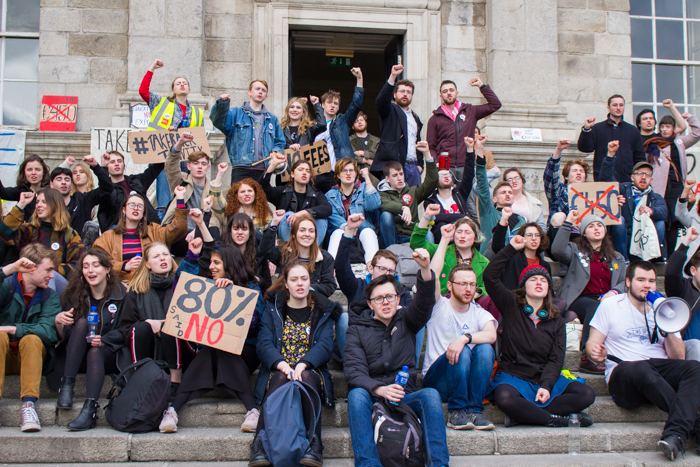Asa Philip Randolph was a famous civil rights leader and labour organiser in the US during much of Franklin D Roosevelt’s presidency. At one event, Roosevelt met Randolph and asked him what his thoughts on civil rights and the future of the country were.
Randolph laid out his views and Roosevelt replied: “You know, Mr Randolph, I’ve heard everything you’ve said tonight, and I couldn’t agree with you more. I agree with everything that you’ve said, including my capacity to be able to right many of these wrongs and to use my power and the bully pulpit. … but I would ask one thing of you, Mr Randolph, and that is go out and make me do it.”
Roosevelt was self-aware enough to see that he could not do all the great things he did alone, no matter how much he may have wanted to. The people would have to make him do it. Crucially, Roosevelt understood how vital protest is to politics.
Students need things to change. People are paying an arm and a leg for bog-standard accommodation, if they are lucky enough to find that
Ninety odd years on from Roosevelt’s comment to Randolph, nothing has changed. People in positions of authority possess considerable amounts of power but mingled in with that power is a strong instinct to not rock the boat. Students need things to change. People are paying an arm and a leg for bog-standard accommodation, if they are lucky enough to find that. Students struggling to pay student contribution fees have to scrounge around for enough money to buy food. For more and more people, college is becoming a less and less attractive option.
Almost everyone agrees that these problems need to be fixed. You would be hard pushed to find someone on campus who thinks the rental market is a fair and affordable system and that the way to fix homelessness is for the government to step back and let the market do its thing. You would also struggle to find people that think college is perfectly affordable for everyone and people from disadvantaged positions should not receive help to access it. If this is the case, then why are people not out on the streets complaining about it on a weekly or at the very least monthly basis?
As students, we are grounded in an age of discourse. We are more than happy to talk about problems but less keen on actually fixing them. This is both a blessing and a curse. Obviously it is bad that people do not want to get out there and fight for what they believe in but at the same time this age has created a large cohort of extremely engaged and politically aware people with strongly held convictions. The trick is how to get these people out on the streets.
Why are people not out on the streets complaining about it on a weekly or at the very least monthly basis?
It can be done. Take Back Trinity, Yes Equality, repeal. All of these movements got students who would not usually protest out onto the streets and forced the government, or the College in the case of Take Back Trinity, to do something about the problems we faced. Thanks to Take Back Trinity, students do not have to pay unfair supplemental fees, international and postgraduate students know how much they will have to pay to attend College every year and we now have two votes on the finance committee, putting us at the centre of decision making in Trinity.
However, the popular support that is so pivotal in igniting change will only come when movements become a bit more vanilla and a bit safer for people. Take Back Trinity was so effective because, for two weeks, all sorts of Trinity students came together under the same umbrella to fight for a common goal. There was nothing overtly political about the protests beyond a few scattered chants of “student power, worker power”, which could be easily ignored. This political vagueness was why people felt comfortable flooding on to Front Square to shout, not feeling like they were being forced to buy into a particular political ideology they may not agree with. Its success lay in its accessibility.
Movements such as Take Back the City should not forget this. A common chant at the Frederick’s Street occupation was: “Fine Gael, Labour, Fianna Fail. Jail, jail, jail them all.” This type of chant, while undoubtedly heartfelt by the protesters, only serve to alienate people who would be sympathetic with the cause but less sympathetic with the idea of jailing our democratically elected representatives. Similar scenes manifested themselves during October’s march for education where Labour activists were jeered by the crowd.
The popular support that is so pivotal in igniting change will only come when movements become a bit more vanilla and a bit safer for people
Students are politically engaged and angry, a perfect mixture for creating a mass movement. But to make protests work, the movements need to be accessible and try to cater for people of all political stripes. The left is invariably at the centre of protests and tempering their rhetoric will undoubtedly be a galling prospect akin to selling out. However, sometimes a sprinkle of pragmatism is necessary to achieve the change sought.







